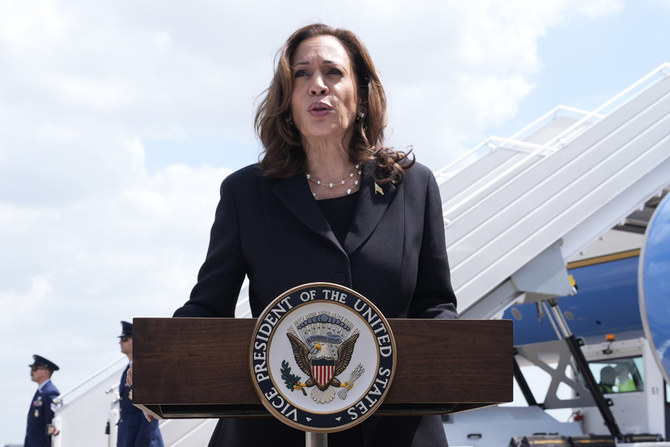The key issues as Harris mulls her vice presidential pick

https://arab.news/muvpg
After President Joe Biden last month dropped out of the US presidential race, Vice President Kamala Harris became the presumptive Democratic nominee. She has received a slew of endorsements from influential figures in her party, including former Presidents Bill Clinton and Barack Obama. Harris has now requested vetting material for several prominent Democrats for her consideration as to who could be her running mate. Her campaign has announced that the name of her vice presidential candidate will be announced by Aug. 7.
Among those being vetted are Pennsylvania Gov. Josh Shapiro, Arizona Sen. Mark Kelly, North Carolina Gov. Roy Cooper, Kentucky Gov. Andy Beshear, Minnesota Gov. Tim Walz and Transportation Secretary Pete Buttigieg, while the name of Michigan Sen. Gary Peters has also been mentioned recently. Other Democratic leaders could be contacted, but their names are being kept secret. Harris is fully cognizant that she must win in the following seven swing states: Arizona, Georgia, Michigan, Nevada, North Carolina, Pennsylvania and Wisconsin.
There are limitations on Harris as she deliberates her choices. It would be very odd if she selected former First Lady Michelle Obama or Michigan Gov. Gretchen Whitmer, as voters might not accept a two-woman presidential ticket. Each of the candidates have strengths and weaknesses. None of them are well known on a national scale. Cooper has already withdrawn from consideration as a potential vice presidential nominee. All of them share Harris’ liberal views, such as the right of women to have abortions, legalizing recreational or medical marijuana and hindering the ability to have access to weapons unless there is a need for them. Notably, all of them support President Biden’s backing of the Israeli government of Benjamin Netanyahu in its war against the Palestinians in Gaza.
These candidates have many vulnerabilities. All lack foreign policy and national security experience. Shapiro is Jewish and Harris could lose Michigan if the big Arab and Muslim communities in that state withhold their support, fearing that Shapiro might advocate strongly for Israel. Shapiro also faces tough opposition from advocates of public schools. He supports private school vouchers. Public school teachers’ unions are against private school vouchers because they give tax credits to the rich for not educating their children in public schools.
The problem for Harris is that she cannot find a vice presidential candidate who is more conservative than her
Maria Maalouf
Kelly will resign his Senate seat if chosen, allowing the Republican governor of Arizona to select a Republican to replace him. This would deprive the Democrats of their majority in the Senate.
Meanwhile, Peters of Michigan has many credentials, among them being his family’s long history in America. One of his ancestors fought alongside George Washington during the Revolutionary War. However, this is not a reason to vote for him. He has been losing popularity and barely won his Senate seat in 2020. By selecting him, Harris would aim to win the 15 electoral votes of Michigan. But people in America vote for the president, not the vice president. For example, Richard Nixon won the election in 1968 but lost Maryland, which was the home state of his running mate Spiro Agnew.
Beshear in 2019 signed an executive order that restored the voting rights of more than 140,000 people convicted of a felony crime. He justified this by saying that they had served their sentences and that their voting rights should not be denied. Nevertheless, many Americans fear that there could be loopholes and errors in a system granting voting rights to felons, as it could permit people convicted of crimes to manipulate it.
There is no electoral advantage in choosing Walz, as Minnesota has voted Democratic since 1972. And there is no guarantee that his selection would help Harris win the two neighboring states of Wisconsin and Michigan.
Importantly, the vice presidential nominee selected by Harris will have to debate against Republican counterpart J.D. Vance. So far, Vance has been on the attack against the Democrats. He is putting them on the defensive in each argument he enters.
The problem for Harris is that she cannot find a vice presidential candidate who is more conservative than her. She is not deliberating the choice of a centrist Democrat. This represents a governing dilemma for the Democratic Party, which is now adopting many left-wing and radical liberal ideas and policies. The party’s ticket for US president could alienate many conservative-leaning Democrats, who might find it more rewarding to vote for Donald Trump if Harris is joined on the ticket by another liberal politician with similar convictions.
• Maria Maalouf is a Lebanese journalist, broadcaster, publisher, and writer. X: @bilarakib









































